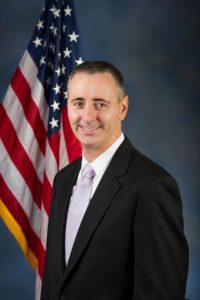
Rep. Brian Fitzpatrick
U.S. Rep. Brian Fitzpatrick (R-PA) proposed a bipartisan bill last week that would protect federal civil servants from returning to a failed patronage system and ensure they cannot be fired for standing up to political pressure.
Rep. Fitzpatrick signed on as the original cosponsor of the Preventing a Patronage System Act, H.R. 302, with bill sponsor U.S. Rep. Gerry Connolly (D-VA), to secure the civil service and protect federal employees from losing statutory job protections and due process rights by preventing any position in the competitive service from being reclassified to an excepted service schedule created after Sept. 30, 2020, according to a bill summary provided by Rep. Fitzpatrick’s office.
“I am proud to introduce the Preventing a Patronage System Act, to make sure that our dedicated civil servants who have put in years of merit-based service are not undercut by patronage and political considerations,” Rep. Fitzpatrick said on Jan. 14. “By strongly supporting experienced civil servants, we will protect merit system principles, which ensure the fairer recruitment of qualified individuals and a more competent, efficient government to help all Americans.”
President Donald Trump on Oct. 21, 2020, signed Executive Order 13957 creating Schedule F in the excepted service. According to Rep. Fitzpatrick’s office, the order would require agency heads to reclassify “policy-determining, policy-making, or policy-advocating” positions to the newly created Schedule F category of federal employees, removing their due process rights and civil service protections, and making it easier for any administration to hire political loyalists and fire qualified experts.
“Employment in the federal workforce should 100 percent be based on merit, skill and experience, not on political connections,” said Rep. Fitzpatrick. “Executive Order 13957 undermines the hard work and dedication of so many career federal workers, who are dedicated to sound, evidence-based policymaking.”
H.R. 302 is supported by numerous groups, including the American Federation of Government Employees, the National Treasury Employees Union, the National Active and Retired Federal Employees Association, the National Federation of Federal Employees, the United Power Trades Organization, and Citizens for Responsibility and Ethics in Washington, among others.



